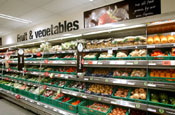Co-op has launched what it describes as Europe’s most extensive in-store collection and recycling scheme for plastic bags, crisp packets, and food wrapping.
The retailer said that the rollout of the scheme is set to see the convenience chain become the first UK supermarket to have fully recyclable food packaging by the end of this month.
Recycling units for ‘soft’ plastics will launch in 1,500 Co-op stores in July and 2,300 stores by November.
The initiative ensures all Co-op’s own food packing is easily recyclable by establishing an accessible disposal route for materials which are unlikely to be collected by UK councils, including: crisp packets, bread bags, single-use carrier bags and bags-for-life, lids from ready meals and yogurt pots, biscuit wrappers and pet-food pouches.
The in-store units – which also accept packaging for food products purchased in other retailers - means that all of Co-op’s own food packaging is easy-to-recycle either via kerbside collection or through the in-house closed loop system.
The retailer estimates that 300 tonnes of plastic bags and food wrapping could be collected per year once the bins are fully in place.
The national roll-out of the scheme follows a successful 50 store film collection trial last year which found that 86 per cent of shoppers were likely to use the service.
It is also designed to reassure concerned communities that the plastics collected will be recycled in the UK.
The recyclable material is turned, by Jayplas, into post-consumer plastic granules which are then made into useful secondary products – including: bin liners; rigid products such as buckets, and material for the construction industry - rather than flooding land-fill sites, going to incineration or, being shipped overseas.
According to Co-op, in some areas, less than 30 per cent of waste from households is currently recycled.
Estimates from WRAP suggest that just 6 per cent of plastic bags and wrapping from UK households is recycled each year, while – by weight – it makes up around a fifth of all plastic packaging.
“As we face into an environmental crisis, we know from our feedback that there is a universal appetite for change,” said Jo Whitfield, Co-op Food chief executive. “Which is why we are making it easier for thousands of households to recycle all of their plastic food packaging."
Whitfield added: "This will not only prevent unnecessary waste but also reduce plastic pollution. By offering a simple and convenient solution to an everyday issue, we believe we can help communities to make small changes, that together will add up to a big difference for our environment.”
Latest News
-
Game closes final standalone stores as administration marks end of High Street era
-
Coty partners with OpenAI to implement AI tools
-
Aldi invests over £22m in latest round of price cuts
-
Ocado CFO to join Kingfisher board
-
UK government to invest £150m to restore ‘ailing High Streets’
-
Walmart increases pay for 3,000 pharmacy technicians
Beyond Channels: Redefining retail with Unified Commerce
This Retail Systems fireside chat with Nikki Baird, Vice President, Strategy & Product at Aptos will explore how unified commerce strategies enable retailers to tear down these barriers and unlock new levels of operational agility and customer satisfaction.
The future of self-checkout: Building a system that works for consumers and retailers
In this webinar, industry leaders discussed what the future of self-checkout looks like and how retailers can make the technology work for everyone.
© 2024 Perspective Publishing Privacy & Cookies










Recent Stories